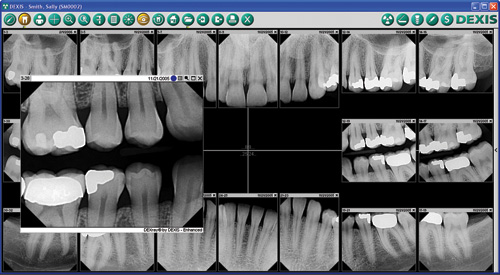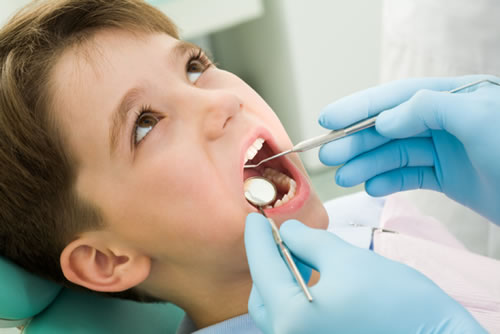Cleaning and Prevention
Oral Health for Overall Health
 Proper oral cleaning and prevention does not only prevent cavities and periodontal disease but perhaps more importantly also affects our overall health and well-being.
Proper oral cleaning and prevention does not only prevent cavities and periodontal disease but perhaps more importantly also affects our overall health and well-being.
A preventive program is a cooperative effort by the patient, dentist, and dental staff to preserve teeth supporting structures by preventing the onset, progress, and recurrence of dental disease.
This program starts at home with good oral hygiene and a balanced diet. It is continued in the dental office by our efforts to promote, restore, and maintain your oral health.
Dental cleaning and prevention also includes regular dental exams, cleanings, and x-rays.
Prevention helps avoid serious and costly dental problems and is the key to having a healthy, confident, beautiful smile.
Dental Exams
We will perform a comprehensive dental exam at your initial dental visit. A regular check-up exam will include the following:
- Examination of diagnostic x-rays (radiographs): Essential for detection of decay, tumors, cysts, and bone loss. X-rays also help determine tooth and root positions.
- Oral cancer screening: Check the face, neck, lips, tongue, throat, tissues, and gums for any signs of oral cancer.
- Gum disease evaluation: Check the gums and bone around the teeth for any signs of periodontal disease.
- Examination of tooth decay: We check all tooth surfaces are for decay with special dental instruments.
- Examination of existing restorations: Check current fillings, crowns, etc.
Professional Dental Cleaning and Prevention
Professional dental cleanings (scaling and root planning) are performed by Registered Dental Hygienists. Your cleaning appointment will include the following:
- Removal of calculus (tartar): Calculus is hardened plaque that has been left on the tooth for some time and is now firmly attached to the tooth surface. Calculus forms above and below the gum line and can only be removed with special dental instruments.
- Removal of plaque: Plaque is a sticky, almost invisible film that forms on the teeth. It is a growing colony of living bacteria, food debris, and saliva. The bacteria produce toxins that inflame the gums. This inflammation is the start of periodontal disease!
- Teeth polishing: Remove stain and plaque that is not otherwise removed during tooth brushing and scaling.
Digital X-Rays

Digital radiography (digital x-ray) is the latest technology used to take dental x-rays. This technique uses an electronic sensor (instead of x-ray film) that captures and stores the digital image on a computer. This image can be instantly viewed and enlarged helping us detect problems easier. Digital x-rays reduce radiation 40-60% compared to the already low exposure of traditional dental x-rays. Because we avoid the use of chemicals, digital x-rays are better for the environment. Dental x-rays are essential, preventative, diagnostic tools that provide valuable information not visible during a regular dental exam. We use this information to safely and accurately detect hidden dental abnormalities and complete an accurate treatment plan. Without x-rays, problem areas may go undetected. Dental X-rays may reveal:
- Abscesses or cysts
- Bone loss
- Cancerous and non-cancerous tumours
- Decay between the teeth
- Developmental abnormalities
- Poor tooth and root positions
- Problems inside a tooth or below the gum line
Detecting and treating dental problems at an early stage may save you time, money, unnecessary discomfort, and your teeth!
Are Dental X-Rays Safe?
We are all exposed to natural radiation in our environment. Digital x-rays produce a significantly lower level of radiation compared to traditional dental x-rays. Even though digital x-rays produce a low level of radiation and are considered very safe, we still take necessary precautions to limit the patient’s exposure to radiation. These precautions include only taking those x-rays that are necessary, and using lead apron shields to protect the body.
How Often Should You Have Dental X-Rays?
The need for dental x-rays depends on each patient’s individual dental health needs. Therefore, a full mouth series of dental x-rays is recommended for all new patients and is recommended to be taken every five years. Bite-wing x-rays (x-rays of top and bottom teeth biting together) are taken at recall (check-up) visits and are recommended once a year to detect new dental problems.
Dental Sealants
 A sealant is a thin, plastic coating applied to the chewing surface of molars, premolars and any deep grooves (called pits and fissures) of teeth. More than 75% of dental decay begins in these deep grooves. Teeth with these conditions are hard to clean and are very susceptible to decay. A sealant protects the tooth by sealing deep grooves, creating a smooth, easy to clean surface.
A sealant is a thin, plastic coating applied to the chewing surface of molars, premolars and any deep grooves (called pits and fissures) of teeth. More than 75% of dental decay begins in these deep grooves. Teeth with these conditions are hard to clean and are very susceptible to decay. A sealant protects the tooth by sealing deep grooves, creating a smooth, easy to clean surface.
Sealants are easily applied and the process takes only a couple of minutes per tooth.
The teeth to be sealed are thoroughly cleaned and then surrounded with cotton to keep the area dry. We apply a special solution to the enamel surface to help the sealant bond to the teeth. The teeth are then rinsed and dried. Sealant material is carefully painted onto the enamel surface to cover the deep grooves or depressions and then hardened with a special curing light.
Proper home care, a balanced diet, and regular dental visits will aid in the life of your new sealants.
Home Care
A beautiful, healthy smile that lasts a lifetime is our ultimate goal when treating patients. Your personal home care plays an important role in achieving that goal. Your personal home care starts by eating balanced meals, reducing the number of snacks you eat, and correctly using the various dental aids that help control the plaque and bacteria that cause dental disease.
Tooth brushing: Brush your teeth at least twice a day (especially before going to bed at night) with a CDA approved soft bristle brush and toothpaste.
- Place the brush at a 45 degree angle to the gums and gently brush away from the gums, ensuring that you always feel the bristles on the gums.
- Brush the outer, inner, and biting surfaces of each tooth.
- Use the tip of the brush to clean the inside of the front teeth.
- Brush your tongue to remove bacteria and freshen your breath.
We recommend electric toothbrushes for certain patients. Research has proven that certain electric toothbrushes are more effective (if used properly) in removing plaque than manual tooth brushing.
Flossing: Daily flossing is the best way to clean between the teeth and under the gumline. Flossing not only helps clean these spaces, it disrupts plaque colonies from building up, preventing damage to the gums, teeth, and bone.
- Take 12-16 inches (30-40cm) of dental floss and wrap it around your middle fingers, leaving about 2 inches (5cm) of floss between the hands.
- Using your thumbs and forefingers to guide the floss, gently insert the floss between teeth using a sawing motion.
- Curve the floss into a “C” shape around each tooth and under the gumline. Gently move the floss up and down, cleaning the side of each tooth.
We recommend floss holders if you have difficulty using conventional floss.
Rinsing: It is important to rinse your mouth with water after brushing, and also after meals if you are unable to brush. If you are using an over-the-counter product for rinsing, it’s a good idea to consult with your dentist or dental hygienist on its appropriateness for you.
Request a Consultation
Please fill out this form to request your consultation. A member of our team will be in touch with you about your appointment as soon as possible.
Family Dental Services in Guelph
We pride ourselves on our high standard of patient care. Being a preventative practice, we are interested in your long term oral health. We offer a wide range of treatment options utilizing the latest technology. When you join the practice you join our family. Your needs are addressed with precision, compassion and understanding.
Contact Us
100 Edinburgh Rd S.
Guelph, ON, N1H 5P4
Phone: (519) 824 – 5678
Email: info@jaindentalcare.com
Clinic Hours
Monday: 8:00AM – 4:30PM
Tuesday: 8:00AM – 8:00PM
Wednesday: 8:00AM – 4:30PM
Thursday: 8:00AM – 8:00PM
Friday: 8:00AM – 4:00PM
